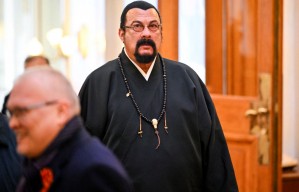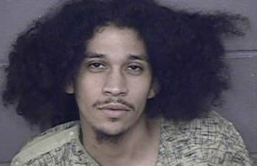The Oglala Sioux Tribe has banned South Dakota Gov. Kristi Noem from the Pine Ridge Reservation. This decision comes in response to the governor's recent comments about reinforcing the United States (US)-Mexico border and alleging cartel infiltration into the state's reservations.
The ban was announced through a statement on social media by Tribe President Frank Star Comes Out, who accused Gov. Noem of exploiting the border issue for political gains, potentially aligning herself with former President Donald Trump and increasing her chances of becoming his running mate. The tension escalated after Noem's speech on Wednesday during a joint session in Pierre on the state's response to the situation at the southern border.
Noem's Border Crisis Rhetoric Sparks Outcry
South Dakota Governor Kristi Noem speaks at the Monument Leaders Rally hosted by the South Dakota Republican Party before introducing former President Donald Trump on September 08, 2023 in Rapid City, South Dakota. Noem endorsed Trump during the event.
In her speech, Noem stated that the US is "in a time of invasion," pointing to the US.-Mexico border as the focal point of the issue. She advocated for sending razor wire and security personnel to Texas to address what she characterized as a threat posed by Mexican drug cartels.
Furthermore, she claimed that these cartels have a presence on several tribal reservations in South Dakota, leading to crimes, including murders, on the Pine Ridge reservation.
President Star Comes Out swiftly responded to Noem's statements, particularly objecting to her use of the term "invasion." He emphasized that the situation at the southern border does not qualify as an invasion and criticized Noem for politicizing the issue.
"Due to the safety of the Oyate, effective immediately, you are hereby Banished from the homelands of the Oglala Sioux Tribe," Star Comes Out declared in a statement directed to Noem on Friday.
The tribal leader stated that the people arriving at the US-Mexico border are primarily Indigenous individuals seeking better opportunities and should not be dehumanized or mistreated.
"They don't need to be put in cages, separated from their children like during the Trump Administration, or be cut up by razor wire furnished by, of all places, South Dakota," he said.
In the four-page letter shared on Facebook, Star Comes Out accused Gov. Noem of using the border situation to boost her political standing and criticized her disrespectful comments about the "Ghost Dancers."
He clarified that the Ghost Dance is a sacred ceremony and condemned Noem's use of the term with blatant disrespect, considering it an insult to the Oyate, meaning the people or nation.
Read Also: US Migrant Crisis: Joe Biden Seeks To Tighten Restrictions Amid Political Pressure
Noem Responds to Ban
Gov. Noem, in response to the ban, clarified that her statement aimed not to blame the tribes but to underscore their victimhood to cartel-driven criminal activity and federal government inaction.
She also expressed her disappointment that politics were injected into a discussion about the federal government's failure to enforce laws at the southern border and on tribal lands. She reiterated her commitment to addressing the challenges collaboratively and highlighted her ongoing efforts to build relationships with tribal communities.
Noem acknowledged the imperfections in these relationships but emphasized the consistent effort her administration has put into working with tribal leaders on various issues, ranging from healthcare to economic development and social services. Despite the ban, she expressed readiness to work with any of the state's Native American tribes to strengthen relationships.
Noem has deployed South Dakota National Guard troops to Texas multiple times, echoing the concerns raised about cartel activity and illegal immigration.
In November of last year, Oglala Sioux Tribe has declared a state of emergency on the Pine Ridge Reservation due to heightened crime, according to AP News.
A federal judge previously determined the government's treaty obligation to support law enforcement on the reservation, highlighting the complex challenges faced by tribal communities.Yet, the judge opted not to decide on whether the Oglala Sioux Tribe was eligible for the complete funding it sought.
Related Article: FBI Letter Warns US Gov. About Consequences of Not Closing US-Mexico Border; Elon Musk Says It's Concerning








